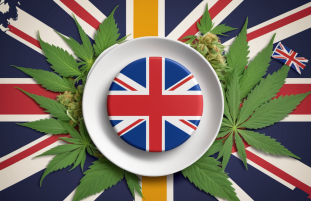Here comes the turning point for the industry! The UK government has created an industrial hemp innovation center.

Driving ChangeThe UK has reportedly established an Industrial Hemp Innovation Center to be managed by Aberystwyth University in Wales.
The center will lead a key UK parliamentary body, marking a renewed effort by UK authorities to reform hemp policy and support industry growth.
Housed at Aberystwyth University, the center will serve as the secretariat for the UK's new All-Party Parliamentary Group (APPG) on industrial hemp. According to industry stakeholders, the new APPG will provide a platform that brings research integrity, agronomic expertise, and policy neutrality to the industry's expansion process.
The new Industrial Hemp All-Party Parliamentary Group was formed after the previous organization, which focused on Cbd and industrial hemp, dissolved. Mired in internal disputes and a crisis of credibility, the previous organization ultimately failed to provide coherent policy guidance despite its initial ambitions set out in its 2022 strategy document, "The UK Plan for the Legalization and Regulation of the Industrial Hemp and Cannabis Sector."
Driving Change
The Industrial Hemp Innovation Center aims to establish Wales as a hub for sustainable economic growth through hemp-based technologies, which have key applications in textiles, construction, biofuels, food, bioplastics, animal products, and pharmaceuticals. The center prioritizes environmental goals, such as carbon sequestration and soil regeneration, while supporting rural economic development and advancing the UN Sustainable Development Goals.
According to industry sources, the launch of the center represents a turning point for the UK's industrial hemp industry. The industry can now develop targeted policy frameworks to address issues such as restrictive licensing, insufficient processing infrastructure, and an underdeveloped supply chain.
Advocates of hemp have long argued that it is a valuable alternative crop for UK farmers because it is fast-growing, low-input, and versatile. However, they also emphasize that, without regulatory reform in areas such as licensing and end-market development, the acceptance of hemp will remain limited.
A platform for progress
As the secretariat for the newly formed All-Party Parliamentary Group (APPG), the Innovation Centre is well-positioned to influence national policy, expand the role of industrial hemp, and promote green jobs and the revitalization of rural communities. After years of false starts, disjointed campaigns, and overly optimistic forecasts, this initiative offers a fresh start for hemp policy in the UK.
Industry representatives have praised the new model for being practical because it is grounded in scientific research and economic feasibility rather than hype. They are optimistic that this more focused, transparent approach will enable the UK to realize hemp's full industrial and environmental potential.
In recent years, UK Parliament has continuously developed policy on industrial hemp and CBD through the formation of the APPG.
Initially, these areas were covered by the CBD Products Taskforce, formed in November 2021 under the APPG's leadership. By 2023, the task force had expanded its scope to include industrial hemp, prompting a name change to the APPG Industrial Hemp and CBD Products Task Force, reflecting the growing consumer interest in cannabinoids and hemp for industrial applications.
The Legacy of Mistakes
The APPG's predecessor struggled with leadership resignations, implosions between industry groups, and divisions over new food regulations, licensing reforms, and transparency in governance. These issues have eroded consumer confidence. The APPG's secretariat, Tenacious Labs, has been criticized for a lack of openness and for serving in the dual role of policy regulator and private CBD operator.
The organization's 2022 roadmap has also sparked skepticism in the industry due to overly optimistic projections. For example, it claims that the UK's hemp acreage will reach 220,000 hectares by 2027—a 27,000% increase from current levels!
However, the document, titled “A Plan for the Legalization and Regulation of the Industrial Hemp and Cannabis Industry in the United Kingdom,” contains several practical recommendations that are still relevant today:
1. transferring administrative oversight of industrial hemp cultivation to the Department for Environment, Food and Rural Affairs (DEFRA);
2. removing the requirement to destroy industrial hemp crops that exceed the pre-tested 0.3% THC threshold;
3. include EU-registered seed varieties in the UK National Seed List and streamline the process of approving new varieties;
4. support for genetic and agronomic research to expand existing certified seed options;
5. a review by the Commission to assess appropriate tetrahydrocannabinol (THC) limits for industrial hemp in the field and for consumer products;
6. measurement of Delta-9 THC content only, excluding other cannabinoids, in regulatory evaluations;
7. establish standardized testing protocols and require product testing certificates from authorized laboratories
8. clearly define product categories based on cannabinoid content and potency;
9. introduce updated guidelines for labeling industrial hemp products;
10. reviewing the Novel Foods Regulation to better apply to hemp-derived food supplements.
11. reconsider the recommendations of the Advisory Council on Drug Abuse, including the portion-based calculation of daily cannabinoid intake.











